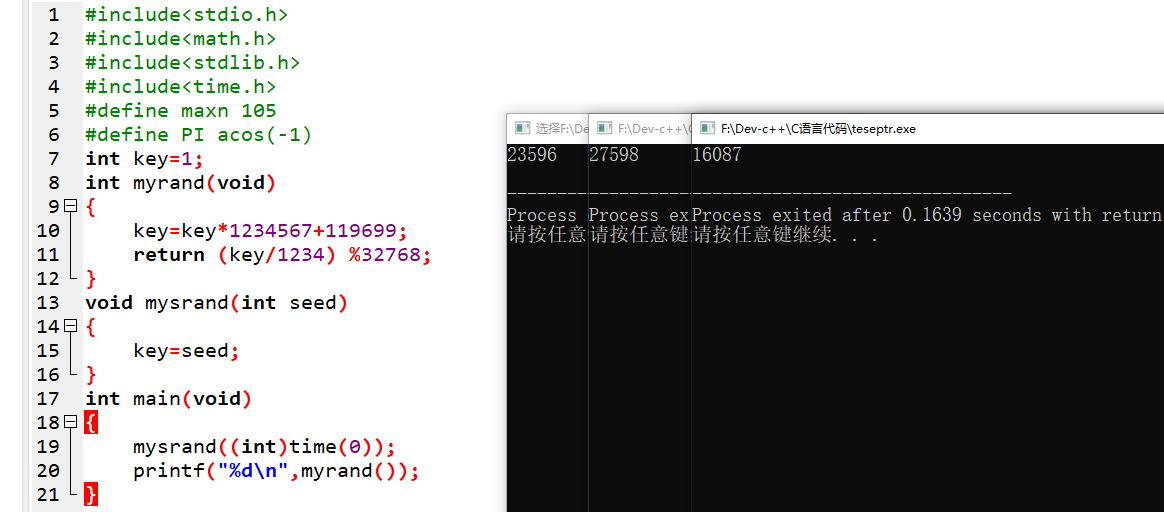rand()
在很多时候我们都会用到随机数,比如代码测试,想自己制造一些数据,许多人也会第一时间想到rand()这个随机生成的函数
来自官方的解释:
不喜欢看英文的小伙伴可以跳过
int rand (void);
Returns a pseudo-random integral number in the range between 0 and RAND_MAX.
This number is generated by an algorithm that returns a sequence of apparently non-related numbers each time it is called. This algorithm uses a seed to generate the series, which should be initialized to some distinctive value using function srand.
RAND_MAX is a constant defined in <cstdlib>.
A typical way to generate trivial pseudo-random numbers in a determined range using rand is to use the modulo of the returned value by the range span and add the initial value of the range:
|
|
Notice though that this modulo operation does not generate uniformly distributed random numbers in the span (since in most cases this operation makes lower numbers slightly more likely).
C++ supports a wide range of powerful tools to generate random and pseudo-random numbers (see <random> for more info).
言归正传,rand()是通过某种算法,产生一个随机序列然后从中选出,并生成一个伪随机数,如果只是用rand的话,你会发现无论你的程序运行多少次,你得到的随机数都是一样的

然后我们继续想,如果不赋值,直接输出rand,结果会一样吗?

结果并不是我们想象的那样,一直不变,原因就是rand生成的是伪随机数,也就是它是通过某种方式生成了一段数的序列,也就是说我们打印的相当于是已经打乱顺序,储存好在数组的元素,因为随机种子一直没变。
由于种子没变,随机序列也就没变,也就是说你用某种算法产生了一个伪随机数列,提前存储在一个数据结构里面,然后每次rand的时候就把序列中的元素拿出来一个。(可以想象成一个数组,每次调用rand,指针向后移一位)
(个人观点,欢迎斧正)
想要多次生成不同的的随机数就需要用到下面的这个函数。
srand
srand也包含在cstdlib里面,此函数是为了生成随机种子,然后让系统产生的随机数不同,通常我们可以结合time使用,time能获取系统时间,让种子不断的随着时间变化,这样就能产生不同的随机数列,也就能用rand产生不同的随机数
time的头文件为ctime
具体食用方法如下:

现在产生的随机数每次运行都不一样。
code:
#include<cstdio> #include<iostream> #include<cstdlib> #include<ctime> //头文件觉得写着麻烦的话可以偷偷懒,写一个#include<bits/stdc++.h>就行 using namespace std; int main(void) { srand((int)time(0));//这里也可以用NULL代替time里面的0 cout<<rand()<<endl; return 0; }
以上就是我对随机数的入门看法,进阶的话等我有时间在更叭
补充:
今天在书上又看到了随机数,我觉得自己写一个随机数和随机种子的函数(其实也很简单)。
先说下原理:我们通过某种计算公式(可DIY),实现对随机数生成的模拟,设置一个全局变量表示种子,
然后各一个种子的值,我们就可以用time的返回值作为种子,然后根据我们自定义的公式进行伪随机数的生成。

代码如下:
#include<stdio.h> #include<math.h> #include<stdlib.h> #include<time.h> #define maxn 105 #define PI acos(-1) int key=1;//种子初始化 int myrand(void) { key=key*1234567+119699;//自定义伪随机数生成公式 return (key/1234) %32768; } void mysrand(int seed) { key=seed;//种子变化 } int main(void) { mysrand((int)time(0)); printf("%d ",myrand()); }
随机数进阶:mt19937